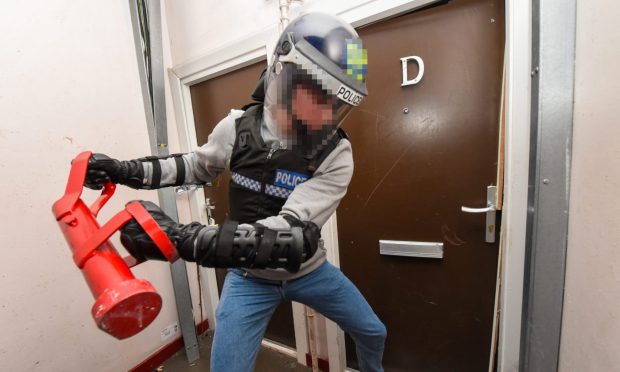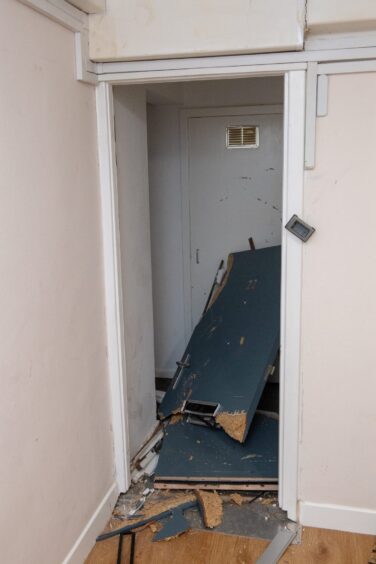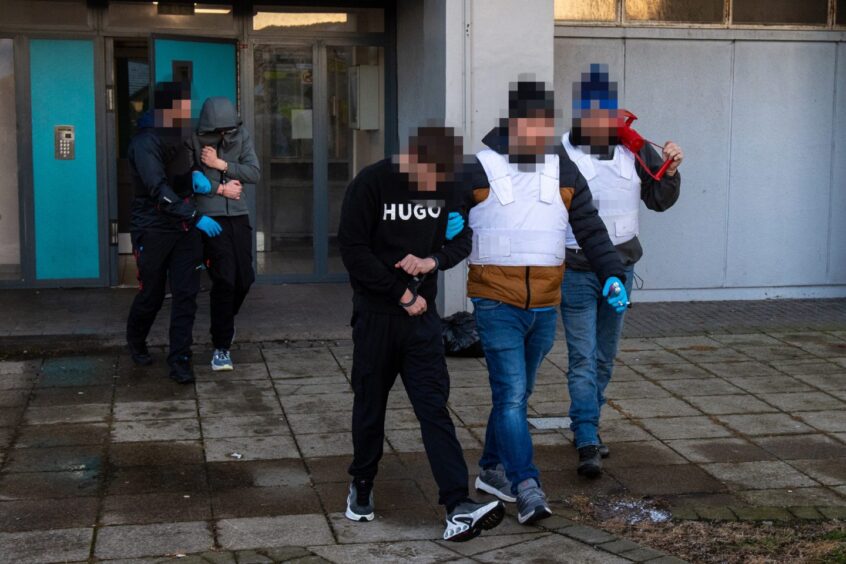When asked to think about the lifestyle of an Aberdeen drug dealer, fast cars, a posh house and designer clothes may come to mind.
But the sight of two men covered in dog mess being dragged out in cuffs from a flat in Balnagask laid bare the grim reality.
Police Scotland invited The Press and Journal to join officers as they targeted properties in the Granite City as part of Operation Highrung last month.
The county lines operation saw 63 people arrested in connection with drugs offences and organised crime in Aberdeen since its launch in June.
A total of £207,000 worth of Class A drugs were recovered, as well as a “significant sum” of cash.
County lines is when criminals from larger cities expand their operations into other locations, often exploiting young and vulnerable people to sell drugs, carry cash and weapons.
Police Scotland worked with the Metropolitan and Merseyside forces to target six gangs operating in the north-east, with connections to London, Liverpool and Hertfordshire.
They acted on intelligence to conduct raids on addresses thought to be used by ‘runners’ for organised crime groups.
‘Runners’ are sent to places like Aberdeen to peddle dangerous Class A drugs such as crack cocaine and heroin, with a “damaging” effect on local communities.
The raids led to 12 people being arrested in the summer, and a further 38 search warrants were executed in Aberdeen between September and November this year – resulting in 48 additional suspects arrested in connection with drugs offences.
North-east officers, along with partners at The Metropolitan Police, also raided several properties in London on November 13.
They arrested a 34-year-old woman and two men aged 39 and 68 in connection with county lines offences.
What happens on a drugs raid?
The Press and Journal was on the frontline with Police Scotland officers last month.
Our reporter travelled with officers in a marked police van as part of a convoy before an early-morning raid.
Despite the inherent danger of the task at hand, squads of officers appeared relaxed and assured during the morning briefing.
At the peak of Operation Highrung, officers carried out up to nine raids a day.
Acting on intelligence, uniformed and plain-clothed officers were told they would target two properties – one in Hilton, and another in Torry.
When asked if he was nervous, Detective Sergeant Sam Harris, who was leading the day’s warrant executions, said “it was just another day”.
When the van stopped, it was a matter of seconds before officers emptied from the vehicle, and organised their way into a shared flat block.
‘Heavies’ had lined up in front of a door of a property suspected to be used by a known drug dealer in the area.
It only took two hits from an officer wielding the infamous ‘big red key’ – a battering ram – to reduce the door to debris.
Shouts of “POLICE!” rang out as police entered the property.
Unfortunately, the man officers were looking for was not at the property, and no drugs were found.
Officers raid flat in Balnagask tower block
The convoy was then dispatched to Balnagask in Torry, with officers on the lookout for two men.
They were working on intelligence claiming the pair had been advertising drugs for sale over the past few days.
However, this raid posed a problem as it was an upper-floor flat in the 14-floor Morven Court tower block.
Raids of this nature give police a limited amount of time to make their way upstairs before suspects hear the ‘rumble’ of incoming officers and attempt to evade arrest.
This puts officers in a state known internally as ‘backside to the wind’ – and sparked a mad dash to the suspect’s residence.
But after taking position outside the flat, the door posed a further challenge.
Three different officers had to take turns to break it down.
Police flooded into the flat but were met with another unique issue as a pungent smell filled the landing.
Officers were forced to avoid a large amount of dog mess strewn across the floor to arrest the duo.
Intelligence ‘the lifeblood’ of Aberdeen drug operations
Detective Inspector Gavin Fleming said Operation Highrung showed an “intolerance” of drugs in Aberdeen.
He said: “Police Scotland remains committed to targeting and disrupting the activities of those people bringing drugs into Scotland and harming our local communities.
“The county lines model shows crime does not respect borders.
“This cross-border operation is just the latest example to show the benefits of working closely with partner agencies, and colleagues across Police Scotland, to target criminal behaviour and underlines our collective commitment to the country’s serious organised crime strategy and taskforce.
“Intelligence is the lifeblood of investigations such as this.
“Communities should not have to tolerate the damage caused by drugs and I would urge anyone with information which can help us deal with those responsible to pass this on.
“If anyone has any concerns regarding the abuse of controlled drugs, or anyone who may be involved in the supply of controlled drugs, they are urged to contact Police on 101 or call Crimestoppers anonymously on 0800 555 111.”




